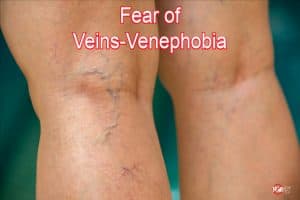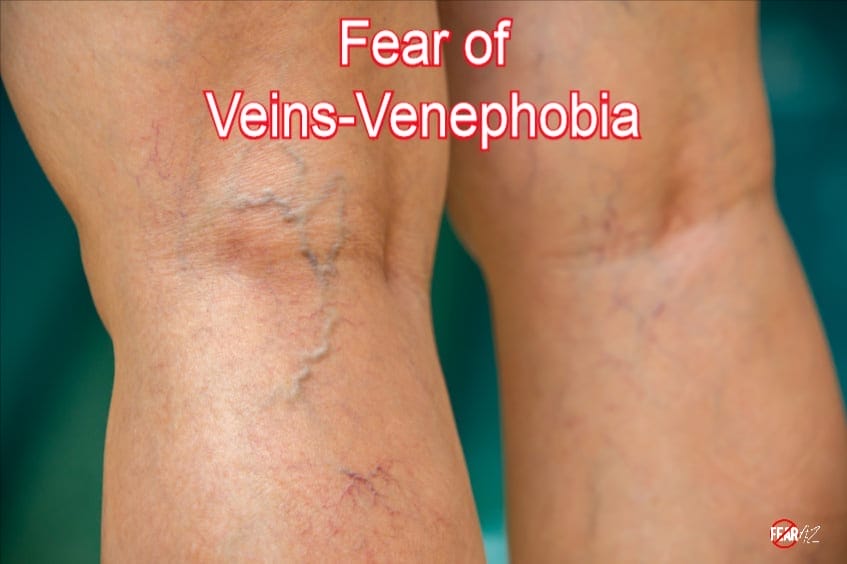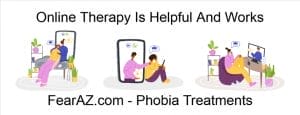Share This Article
The Fear of Veins: A Rare Phobia
Are you someone who can’t look at your own wrists, hands, or neck, because you can’t stand the sight of veins or arteries? Do you have trouble breathing when you even think about veins?
Do you shake or tremble or feel like you might faint after seeing a vein? Do you refuse to go to the doctor or resist surgeries because you’re terrified of veins?
Does a fear of veins mean you’ll never be able to lead a normal life? No. It does not.
You can alleviate your phobia of veins. But to do this, you must first understand why you have this fear. Once you discover the answer to this question, you can focus on how to cope with it and lead a normal life.

What Is the Fear of Veins?
Venephobia refers to the fear of veins, derived from vene, a variant of veno, which means vein, and the term phobia, which denotes the fear of something irrational. Venephobia is also known as carpophobia. Individuals suffering from this fear have a very difficult time looking at their own veins and arteries. This may cause them to have anxiety attacks, which may also lead to depression.
Those with venephobia may also experience a fear of being touched on specific areas such as their wrist, neck, inner arms, Achilles tendon, or back of the legs, where they can see a vein or feel a pulse.
A Phobia of Fear or Disgust?
But how common is the phobia? Phobias like this aren’t very common, and few people suffer from venephobia compared to other types of phobias.
Venophobia or Carpophobia Causes
If you’re wondering what could have caused your fear of veins, read on.
Just like any other phobia, there is no exact known cause for the fear of veins, but it may be related to an incident in your past. You may have experienced a trauma involving veins, one which lodged in your memory.
Although past traumatic events are the most probable cause for most phobias, genetics may also play a role in the development of phobia. If there are members of your family who suffer with anxiety or phobia, you may, too. Your environment may also contribute.
Symptoms of Venephobia
The fear of veins causes several symptoms. Almost all phobias have similar types of physical and psychological symptoms. In the case of venephobia, symptoms may be triggered by seeing or thinking of veins on one’s own body or on someone else’s.
Venephobia may cause the following physical symptoms:
- Shaking or trembling
- Cold flashes
- Sweating
- Rapid heart rate
- Trouble breathing
- Tightness in the chest
- Nausea
- Headache or dizziness
- Numbness in the body
- Dry mouth
- Disorientation
Venephobia may cause the following psychological symptoms:
- Panic attacks
- Anxiety
- Feeling like you have lost control
- Feeling like you may pass out
- Feeling powerless
- Feeling sad
- Anger
- Fear of harm
Vein Phobia Treatment
If your venophobia doesn’t impact everyday life, you may not need treatment. However, it’s recommended you visit your doctor if you experience any of the following symptoms:
- You are having panic attacks frequently
- You are not able to lead a happy life
- You always get anxious around people
- You avoid your family or others because of the phobia
- You are struggling to cope with the phobia
- The phobia has been bothering you for more than six months
Treatment for venophobia can help you better manage your fear of veins. Therapy can help in the following ways:
- Analyze your thoughts and actions to recognize unhealthy patterns
- Help you resolve complex feelings
- Help you organize your thoughts
- Provide a space where you can talk without feeling judged
- Guide you on how to deal with situations that make you uncomfortable
- Help you take control over your mind and body
Vein Phobia Treatment Options
Self-Help
Self-reflection: Self-reflection is key to overcoming fear. Try to understand that this phobia can’t harm you. You can use self-reflection to cope with your feelings when exposed to your phobia. Having the ability to reflect is important not just for controlling your phobia but for other situations you may face in your daily life.
Relaxation: Relaxation can help you learn how to control your feelings and thoughts when exposed to your phobia. This includes deep breathing, yoga, and other relaxation techniques. These simple methods will help you ease physical symptoms.
Meditation: Meditation may help reduce the frequency of anxiety or panic attacks. Research has shown that mindfulness-based meditation helps individuals cope with different phobias. Meditation trains our minds to live in the moment and helps manage our thoughts about the object of fear. Since phobia is rooted in past events and anxiety is often caused by a fear of the future, when we focus on the present, we limit the number of causes for our brain to react.
Other Self-Help Tips
- Desensitize yourself
- Partner up
- Join a support group
- Relax, visualize, and practice breathing techniques
- Challenge negative thoughts about your phobia
- Learn to calm down quickly
Professional Help
Cognitive therapy: In cognitive therapy, the idea is that our thoughts and perceptions always affect our actions. This therapy prepares you for the actual exposure to the phobia. It teaches you how to identify if what you are feeling is real and, if it is not, how to overcome it. For example, the therapist will help you identify your feelings around veins and what to do.
Medication: Not many healthcare professionals recommend using medication for phobias. They may prescribe medication to alleviate symptoms like anxiety.
Exposure therapy: In exposure therapy, the therapist will gradually expose you to the object of your fears—in this case, veins. This will help you face your fears and resolve them over time.
How to Avoid Fear of Veins Altogether
Many who suffer from venephobia don’t seek treatment, because they think they can avoid what they fear. However, to truly avoid the fear, you need to delve into its cause, expose yourself to it gradually, and resolve it once and for all.
In Conclusion
Phobias are severe emotional and psychological problems caused by an irrational fear that interferes with our daily lives. The very thought of overcoming this may seem intimidating to you, but it isn’t impossible. Instead of running from these situations, try your hand at dealing with them. In case you still don’t believe you can overcome this, share the feelings you are experiencing with someone you trust, such as family or friends. Many have overcome phobias and are living healthy, happy lives. You can, too.




